Chinese Slang 😎 41 Sick Ways To Speak Like A Native
Most spoken Chinese slang comes from different dialects.
Depending on where you’re learning Chinese, your accent will most probably change to use the local slang if you’re speaking and hanging out with the locals.
Whether in Beijing, Shanghai or Taiwan – all dialects are very different.
So without beating around the bush, let’s dive straight into the good stuff and teach you the (most up to date and best) Chinese slang you NEED to know!
Chinese Slang || Internet Slang
Chinese Slang || Using Numbers
Chinese Slang || Using Letters
Chinese Slang || Society
Chinese Slang || FAQs
Internet Slang
One thing Chinese slang has in common throughout the entirety of China is the use of Chinese slang on the internet.
If you’re using Chinese social media websites (which by the way is a great way to immerse yourself into Chinese culture, get Chinese friends and learn Chinese) such as Weibo, Douyin or QQ, then you may be a bit confused initially by the amount of colloquialisms used.
The amount of numbers that float around with apparently no meaning in comments is clear from the beginning. We’ll come to this shortly!
Also, you will see a large amount of random capital letters amongst the Chinese Characters that also appear to have no meaning.
Actually, all of these colloquial expressions of numbers and letters all have a very specific meaning and all have a (somewhat) logical origin.
You’ll discover some of these as you read on…
光想青年 (guāng xiǎng qīngnián)
This internet slang refers to young people who proclaim to have many ideas and or many intentions to do things.
However, when it comes down to it they end up just procrastinating and not putting any of them into practice.
For example someone who always says that they want to improve their Chinese and will sign up for online classes but then they never actually get round to doing it.
绿茶婊 (lǜchá biǎo)
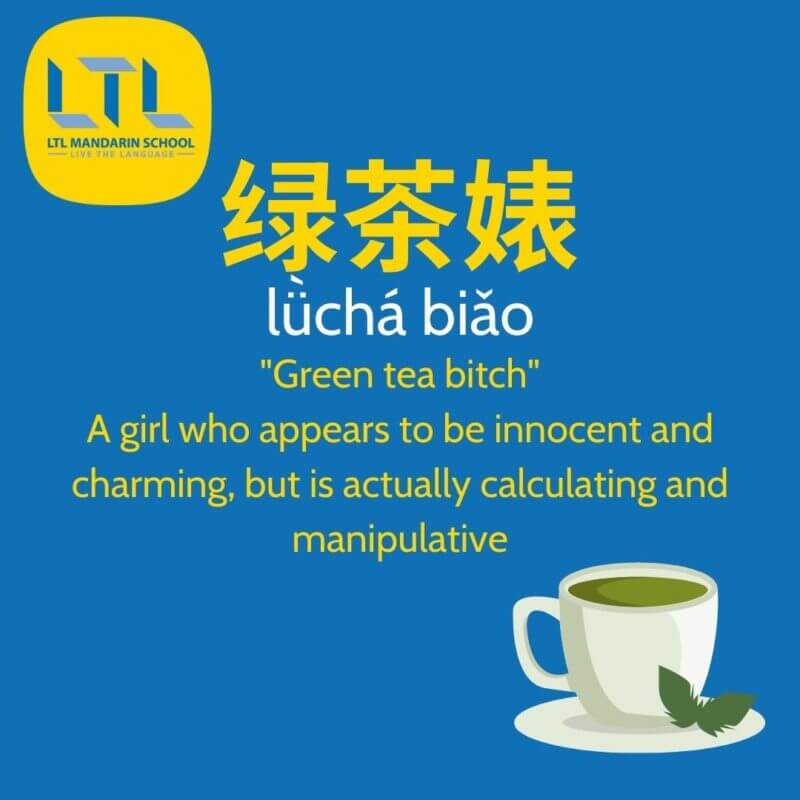
Green tea bitch is an internet slang term used to describe a girl who appears to be innocent and charming….
But in fact the girl is only faking this and is actually calculating and manipulative.
It’s unclear why exactly the term “green tea” was used.
Some people think it’s because many green tea commercials use innocent looking female models to represent the “purity” of green tea.
宅 (zhái)
The word 宅 (zhái) means residence or house but has now become slang to refer to someone who is a bit antisocial.
宅 basically describes someone who enjoys just hanging out at home or who will refuse invitations to go out and prefer prefers to stay at home.
小鲜肉 (xiǎo xiān ròu)
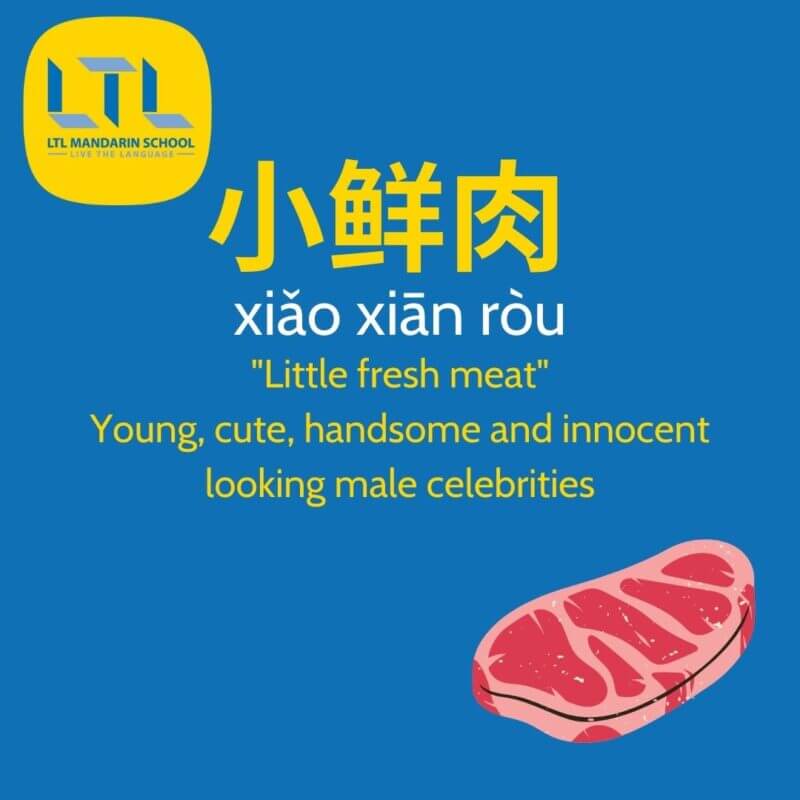
This phrase literally translates to “little fresh meat” which perhaps sounds like something you’d order off the menu at a Chinese hotpot restaurant.
However, this is actually used to describe young, cute, handsome and innocent looking male celebrities, or “male idols” as they’re often called.
They are normally between the ages of of 12 and 25.
Recent beauty standards in China has led to boys with more feminine and androgynous looks being regarded as the most handsome.
Originally, it was used on celebrities such as popular K-Pop stars, but now it can refer to ordinary guys as well, as long as they fit the criteria.
比心 (bǐxīn)
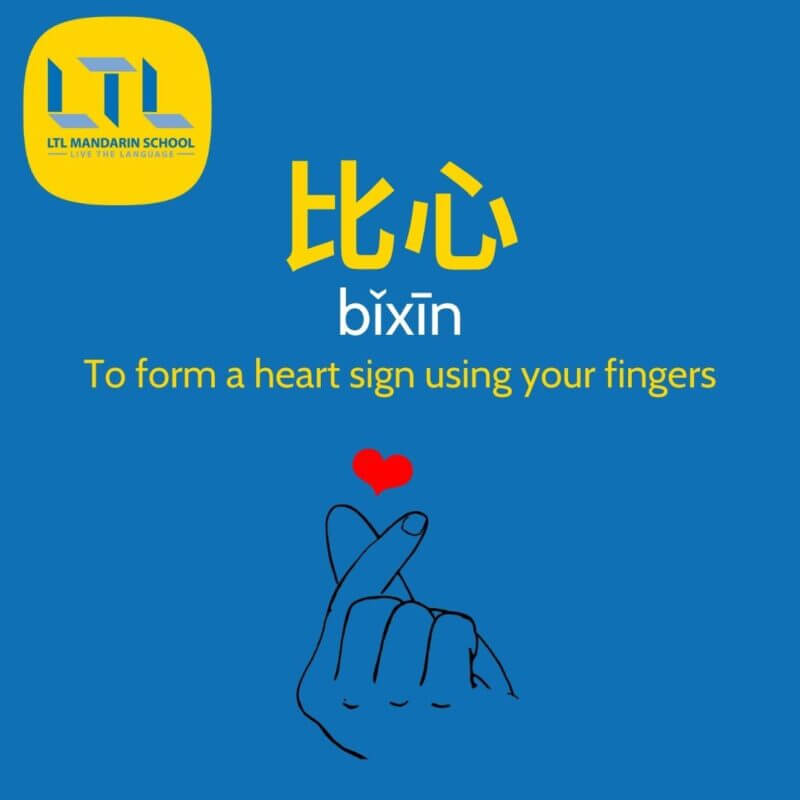
If you follow any Chinese celebrities on social media we guarantee that you will have seen them posing with a 比心 (bǐxīn).
This slang means to form a finger heart which is a gesture in which a person forms a heart shape using their fingers.
This pose overtook Chinese social media a while back, you can think of it as the new peace sign which you always used to see Chinese people making.
一起爬山吗? (yìqǐ páshān mɑ?)

Now we have quite a funny slang that became a super popular meme in 2020.
The Chinese 一起爬山吗 (yìqǐ páshān mɑ?) seems simply like the innocuous question “Want to go on a hike?”, however it actually has much darker undertones.
What the phrase has actually come to mean is that it’s a “death invitation” or 死亡邀约 (sǐwáng yāoyuē).
It comes from the 2020 hit drama The Bad Kids where the opening scene of the first episode is of one of the main characters pushing his in-laws off a cliff (ouch).
After the series went viral memes with the caption 一起爬山吗? (yìqǐ páshān mɑ?) started popping up all over Chinese social media.
凡尔赛文学 (fáněrsài wénxué)
You might already be familiar with the word 凡尔赛 (fáněrsài) as the transliteration of the French palace Versailles. Added to this is 文学 (wénxué) meaning literature but no this slang isn’t talking about Versaille literature.
Instead it’s a term used to describe “the humble brag” it refers to people who flaunt their wealth or or success in a subtle way.
It comes from the Japanese manga series “The Rose of Versailles” a story about the lavish lifestyle or Marie Antoinette who famously said “let them eat cake”.
柠檬精 (nínɡménɡ jīnɡ)
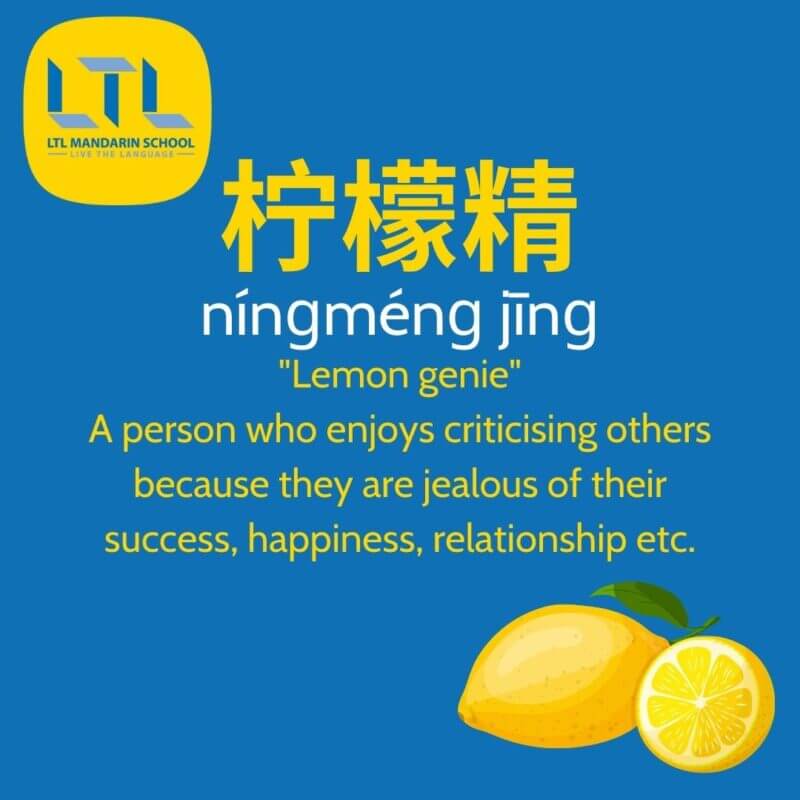
This Chinese slang phrase can be broken down into two parts:
柠檬 (nínɡménɡ) which means lemon.
精 (jīnɡ) which means genie or spirit.
Hmmm so what on earth could “lemon genie” be a slang term for?
Well it refers to people who enjoy criticising others because they are jealous of their success, happiness, relationship etc.
我太难了 (wǒ tài nán le)
A phrase that became very popular in 2019 我太难了 (wǒ tài nán le) means “my life is really hard”.
The term originated on a Chinese video-sharing app where the celebrity Brother Giao talked about how much pressure he was under having to meet a lot of deadlines etc. and said 我太难了 (wǒ tài nán le).
The video went viral and Chinese netizens created some very funny animated emojis, some people also switch the 难 for “南” (meaning “south”) to make it even more amusing (as in things are going south).
你行你上 (nǐ xíng nǐ shàng)
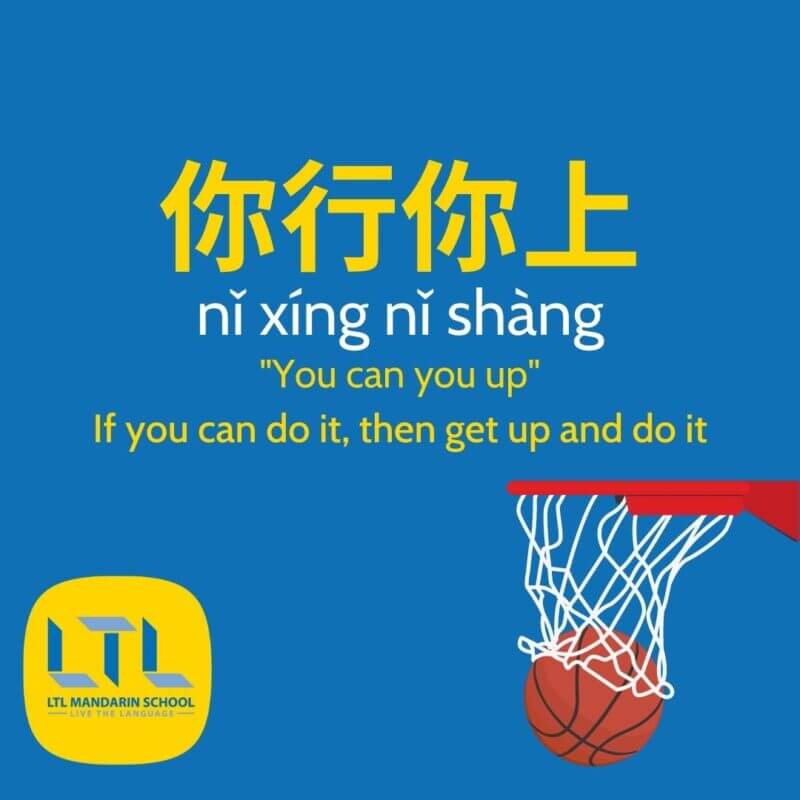
This slang literally means “you can you up”.
In fact, sometimes you will also see it posted in English this way rather than Chinese.
The phrase originated during an argument between Chinese basketball fans and means “If you can do it, then get up and do it”.
Chinese Slang Using Numbers
Many Chinese numbers sound very similar to how another character may sound, therefore mimicking the meaning.
Chinese people can be very creative in this way when they create new colloquial expressions.
This is especially true in the form of internet slang with numbers!
On that note, it’s a good idea for us to learn the numbers in Chinese.
Don’t worry it’s super quick and simple…
666
Probably the most common phrase found in the internet slang world in China, the colloquialism 666 (liùliùliù) comes from 牛牛牛 (niuniuniu) meaning awesome, excellent, great etc.
It definitely doesn’t have anything to do with the English meaning of this slang term which is often related to the Devil.
When using colloquial Chinese slang, you will also hear younger people using street slang saying this.
This can also be represented by holding your hand up to represent the number 6 in Chinese counting number language and waving it around.
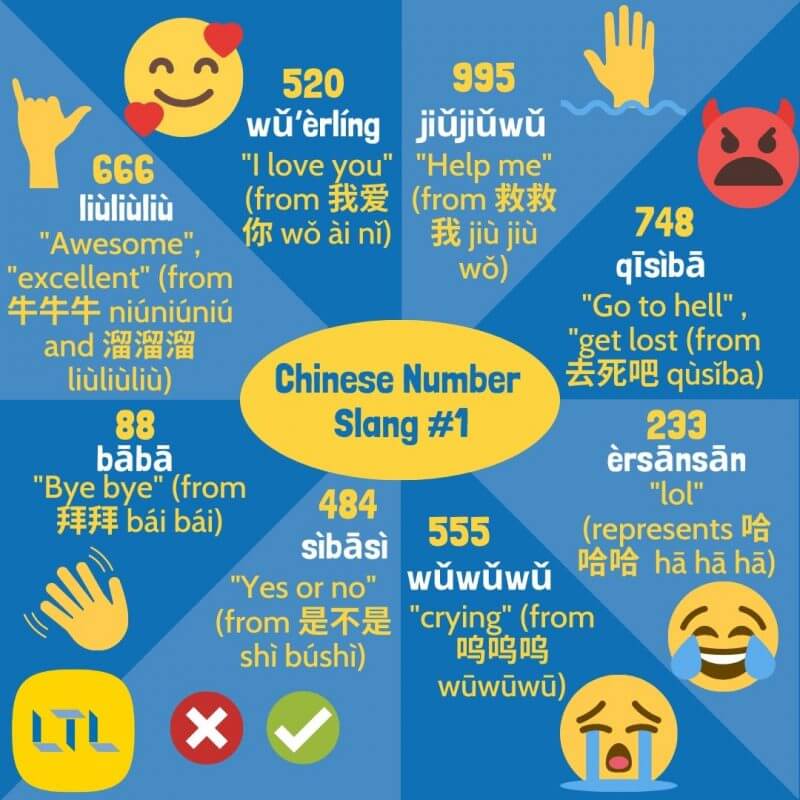
520
Probably the second most common phrase you will see on internet slang or hear as street slang, especially around the date 5/20. (20th May). This date is Chinese internet Valentine’s Day.
This is due to the fact that 520 (wǔ’èrlíng) represents 我爱你 wǒ ài nǐ which is Chinese for “I love you”
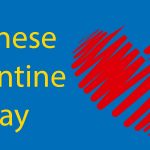
Chinese Valentine’s Day 💕 Don’t Forget the Date(s)!
Dealing with one Valentines Day per year is too much for many 💕 Well, count yourself lucky you’re not celebrating a Chinese Valentines Day.
995
995 (jiǔ jiǔ wǔ) stands for 救救我 (jiù jiù wǒ) meaning ‘Help me!’
Not sure why you would need to use this one on internet slang or street slang, but it a common colloquial expression used in Chinese slang – perhaps sometimes used in an amusing or ironic way.
748
This in pinyin is qīsìbā. This represents 去死吧 (qùsǐba).
This is pretty much a translation for “Go to hell“, “Get lost”, or, more literally “Go die!”.
88
“Bye bye” in Chinese also means the same as in English, goodbye.
88 (bābā) sounds like the same Chinese equivalent for ‘Bye Bye’. So, when ending that conversation impress your mates with saying ’88’.
233
233 represents the sound of laughter.
The pinyin is èr sān sān which is similar to the 哈哈哈 (used as ‘lol’) which sounds like ‘hā hā hā‘.
555
Like how 233 represents the sound of laughter 555 (wǔwǔwǔ) represents the sound of crying.
This comes from the characters 呜呜呜 (wūwūwū), which you have to admit does sound a lot like someone crying!
484
484 (sìbāsì) is similar to the 是不是 (shì búshì) meaning yes or no.
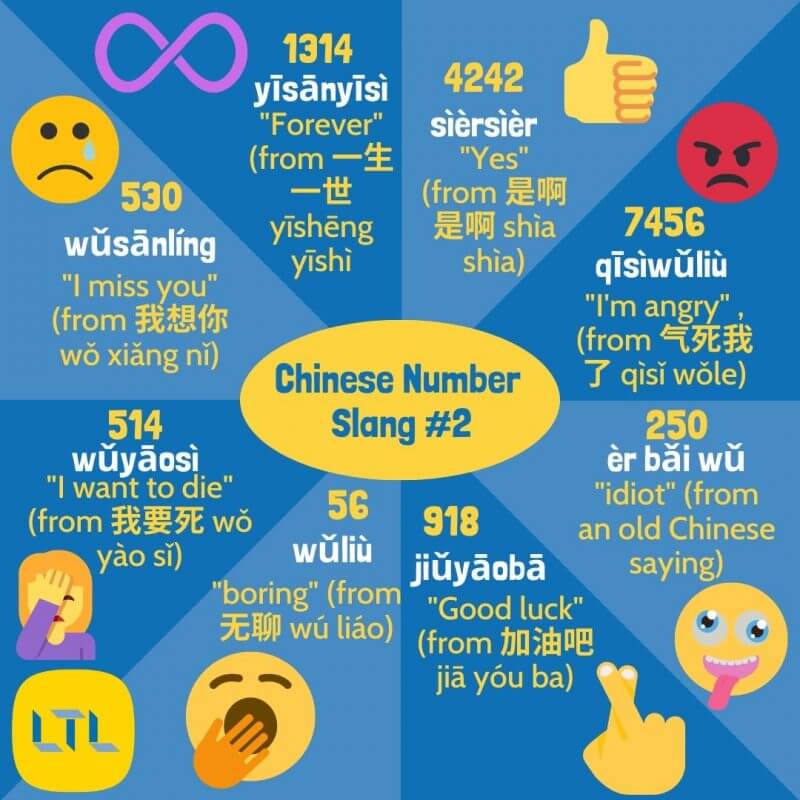
530
The pinyin for this one is wǔsānlíng which sounds like the Chinese for “I miss you” which is 我想你 (wǒ xiǎng nǐ).
1314
You’ll usually see 1314 (yīsānyīsì) after a phrase such as I love or even the slang 520, can you guess what it means?
It comes from the Chinese 一生一世 (yīshēng yīshì) which means “forver”.
4242
Say this one aloud (sìèrsìèr) and you might be able to tell what it is.
This one represents saying “Yes” which in Chinese can be 是啊是啊 (shìa shìa).
7456
This Chinese number slang means “I’m angry”, 756 (qīsìwǔliù) represents the phrase 气死我了 (qìsǐ wǒle).
918
Now this one you will see a lot whenever someone is sending encouraging thoughts. 918 (jiǔyāobā) represents the phrase 加油吧 (jiāyóu ba) which means “good luck” or “come on!”.
Fun fact 加油 (jiāyóu) literally means to “add oil” and can also be used to mean refuel.
514
The pinyin for this one is wǔyāosì which sounds like you’re saying 我要死 (wǒ yào sǐ) which means “I want to die”. Yes, this may seem a little over dramatic, but hey that’s the world of Chinese netizens after all!
56
If someone sends a 56 your way prepare to be insulted as 56 (wǔliù) means “boring” or 无聊 (wúliáo) in Chinese.
996
This is an interesting one that relates to the long, hard working culture in China.
- 9 – 9am start
- 9 – 9pm finish
- 6 – 6 days a week
This is a fairly common concept in China (mainly in tech companies or startups) and for those of you not so keen on maths, that’s 72 hours every working week, with just Sunday off to enjoy.
And guess what 996 workers generally like to do on a Sunday… yep you guessed it! Sleep 😴
250
Lastly on our list of Chinese slang that uses numbers we have 250 èrbǎiwǔ which means “idiot”.
Unlike most of the other number slang phrases on our list this one doesn’t represent a phrase that it sounds similar to. Instead 250 actually refers to an ancient Chinese saying for idiot.
Basically in ancient China they used a currency called 吊 diào and 1000 was a unit or “stack” of that currency.
So half a 吊 diào was a 半吊子 bàndiàozi or 500.
To show modesty scholars would say they were a 半吊子 bàndiàozi or “half a stack” to be self deprecating.
Then half of 500 is 250, so to not even be a half stack you really must be an idiot!
Chinese Slang Using Letters
We aren’t finished there! Time to switch numbers for letters.
Here’s our favourites with explanations.
TMD
This expression stands for 他妈的 (tāmāde) and should not be thrown around and is probably best used amongst friends only…
It’s basically used as a way to express extreme annoyance, similar to saying ‘F*ck you’ in English.
We’ve got a load more featuring letters on our Chinese Swear Words blog we are sure you’ll love also!
YYDS
YYDS is like the equivalent of GOAT in English, which stands for the greatest of all time.
It’s an abbreviation of the Chinese 永远的神 (yǒnɡyuǎn de shén) which literally means “forever the God”.
It originated when famous eSports player Shiny Ruo shouted Uzi 永远的神 (Uzi yǒnɡyuǎn de shén) to his idol Uzi, a retired Legend of League player.
CP粉
Here the CP stands for “couple” and 粉 means fan, so it literally translates to “couple fans”.
This is basically the equivalent of “shippers” in English (you “ship” or support two people to be in a relationship), however CP粉 perhaps a little more intense.
You can “ship” both couples of opposite sex and couples of the same sex.
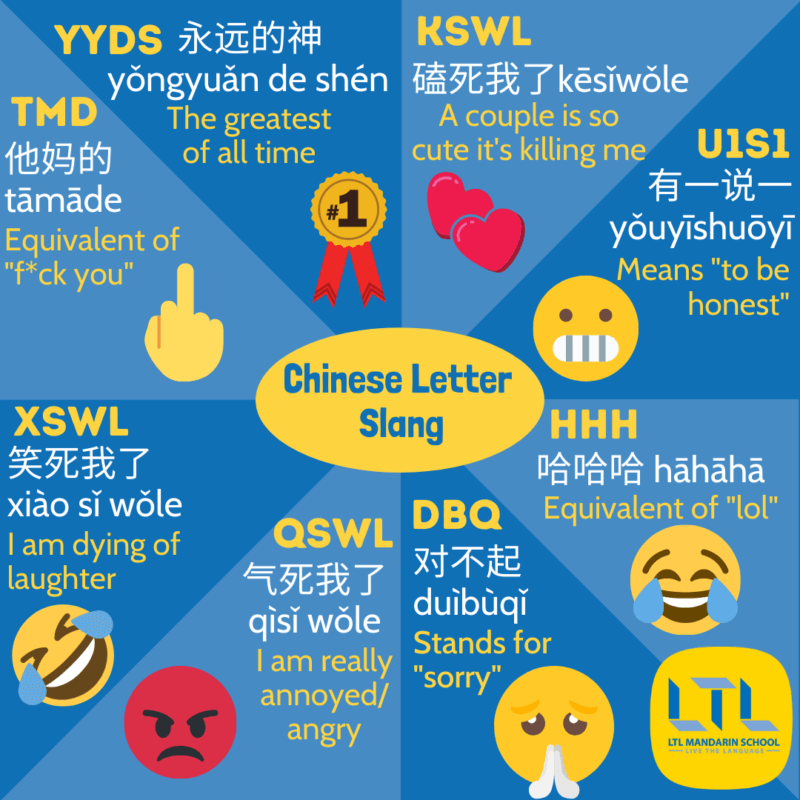
KSWL
Now KSWL is a rather unique slang which doesn’t really exist in English.
It stands for 磕死我了kēsǐwǒle which is used to talk about a couple who are being so cute and sweet it’s killing you.
It’s mostly used by CP粉 (which we saw above) while they are watching their favourite couple in a Chinese drama etc.
HHH
A nice easy one next we have HHH which simply stands for 哈哈哈 (hāhāhā) or the equivalent of LOL in Chinese.
U1S1
A combination of both letters and numbers this abbreviation stands for 有一说一 (yǒuyīshuōyī) which means “to be honest”.
It’s normally used at the beginning of sentence where you’re going to be frank with someone.
XSW
This is similar to the English slang abbreviation ROFL (roll on the floor laughing).
XSWL stands for 笑死我了 (xiào sǐ wǒle) which basically means “I’m dying of laughter”.
QSWL
Next we have QSWL which is pretty much the opposite to the slang above (XSWL).
It stands for 气死我了 (qì sǐ wǒle) which means I’m extremely annoyed/angry or more literally “you’ve angered me to death”.
DBQ
To finish off we have another straight forward abbreviation DBQ which just means 对不起 (duìbùqǐ) the word for sorry in Chinese.
Chinese Slang About Society
These words and phrases will help you learn more about what is going on in China and what Chinese people are talking about.
We’ve chosen our favourite slang words and topics to share with you:
Left-Over Women 剩女 (shèngnǚ)
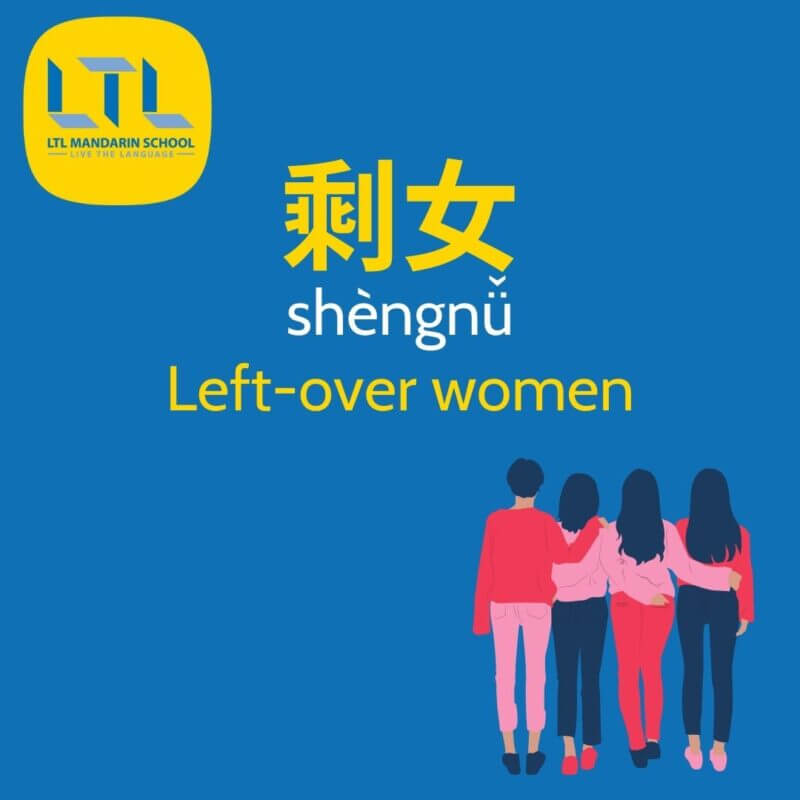
Characters:
剩 (shèng) – to be left over
女(nǚ) – female
Meaning:
This word relates to the issue that Chinese girls don’t get married as young as they did before. But the preconceptions still hold.
So if they aren’t married by around the age of 28, people call them ‘the left-over girls’.
This is a derogatory term for the girls who are usually very focused on their careers.
Left-Behind Children – 留守儿童 (liúshǒu értóng)
Characters:
留守 (Liúshǒu) – to stay behind to take care of things儿童 (értóng) – children
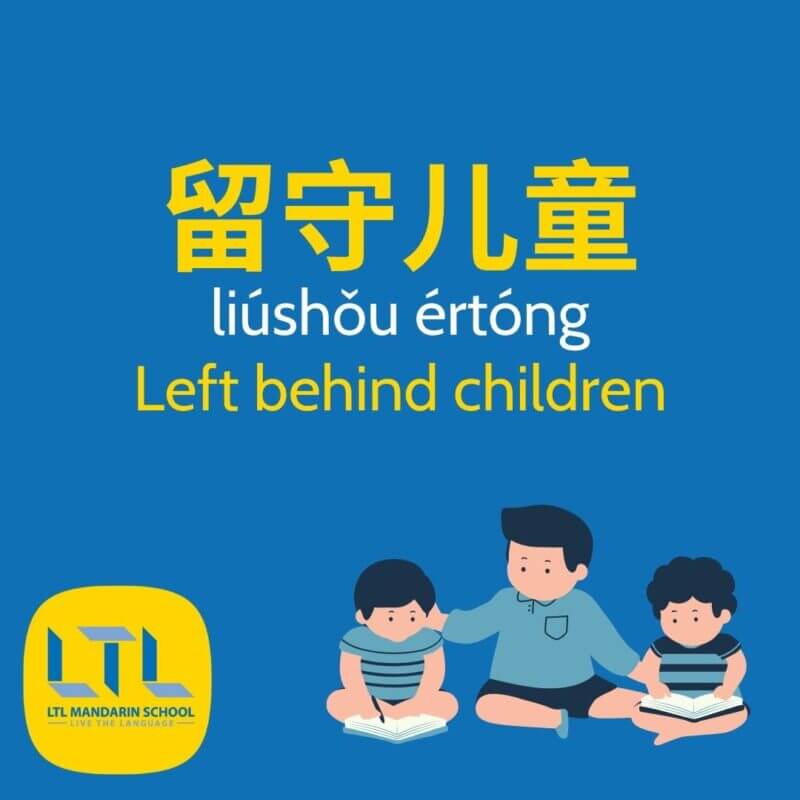
Meaning:
This word relates to the issue that many poor village people migrate to the factory towns far away from home
When doing this, they leave their children behind with grandparents or even on their own.
The problem is widely discussed in Chinese society, because there is sadly a high suicide rate amongst these so called “left behind” children.
Naked Marriage – 裸婚 (luǒhūn)
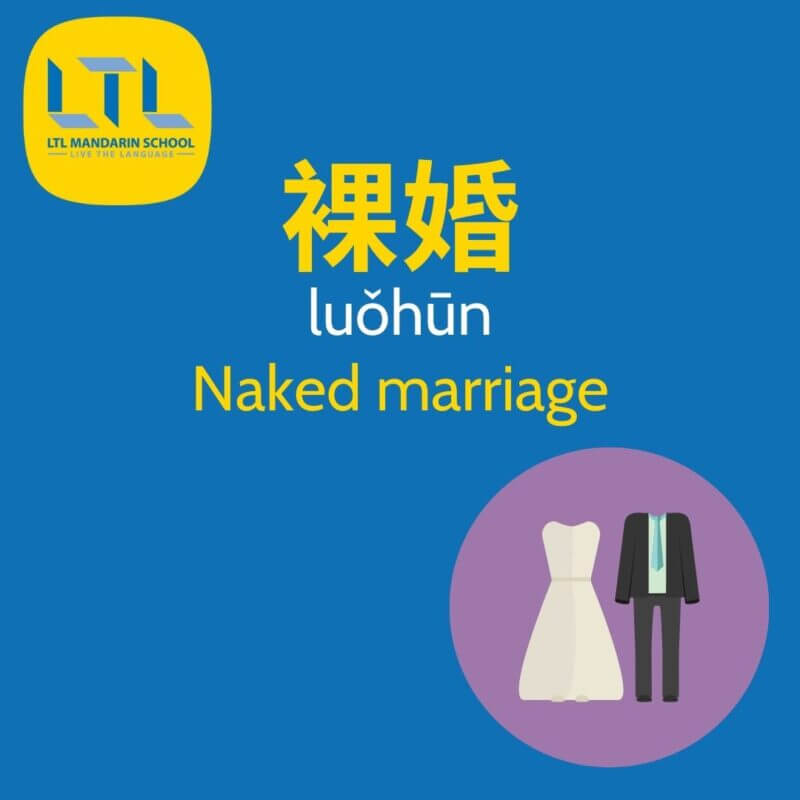
Characters:
裸 (Luǒ) – naked
婚 (hūn) – marriage
Meaning:
This is an interesting term because it originated from a girl who once said on social media that she would rather be crying in an expensive car than be happy on the back of a bike.
What she meant by this is that she was more concerned about the financial part of her future marriage than the actual love part. Since then the Chinese people have often discussed which one is more important.
Some people go for a naked marriage, which means that the boy hadn’t yet bought an apartment or car – which are usually the requirements for marriage in China.
The naked marriage is more about love and less about materialistic goods.
Geek/Nerd/Gamer 宅男/宅女 (zháinán/zháinǚ)
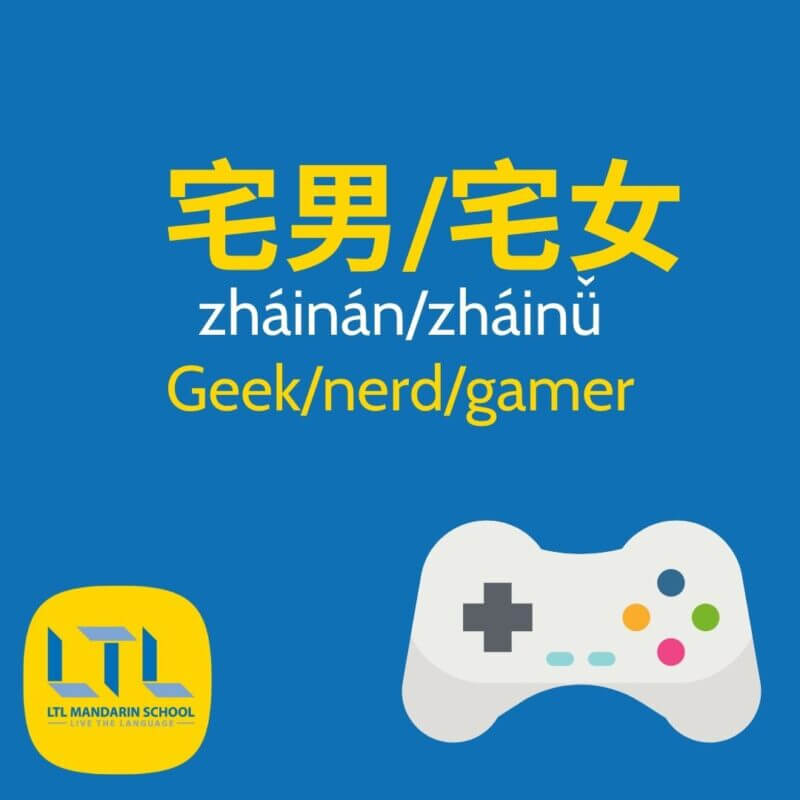
Characters:
宅 (Zhái) – house
男 (nán) – male
女 (nǚ) – female
Meaning:
China has turned into an internet-addicted society and there is Wi-Fi wherever you go.
Chinese people are online most of the time and of course this comes with problems as well.
Internet-addiction is a huge issue (if you search it online, you’ll find articles discussing how Chinese parents send their children to internet rehab camps – military style).
The term 宅男/宅女 literally means a person who spends all day and night at home watching TV shows, playing video games etc.
Singles Day – 光棍节 (guānggùn jié)
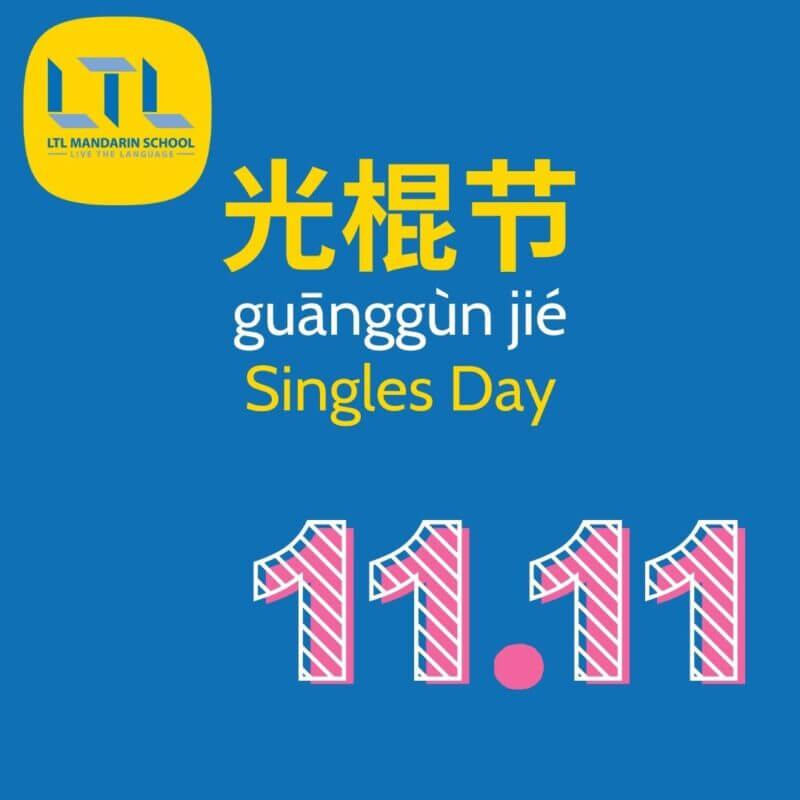
Characters:
光棍 (Guānggùn) – bachelor/single (or literally, bare stick)
节 (jié) – Festival
Meaning:
In contemporary China it is all about finding the one and only, being in a relationship, getting married and being safe and sound for the rest of your life.
Singles day is on the 11th of November every year because the date looks like four single people standing beside each other (11.11).
This day has become the biggest shopping event of the year – the Chinese go crazy on Taobao (Chinese EBay) and all the other shopping apps out there. There are a ton in China!
In the West it’s some kind of equivalent to crying and eating chocolate on Valentine’s Day and Black Friday Sales.
And speaking of that…
Eat Dirt – 吃土 (chī tǔ)
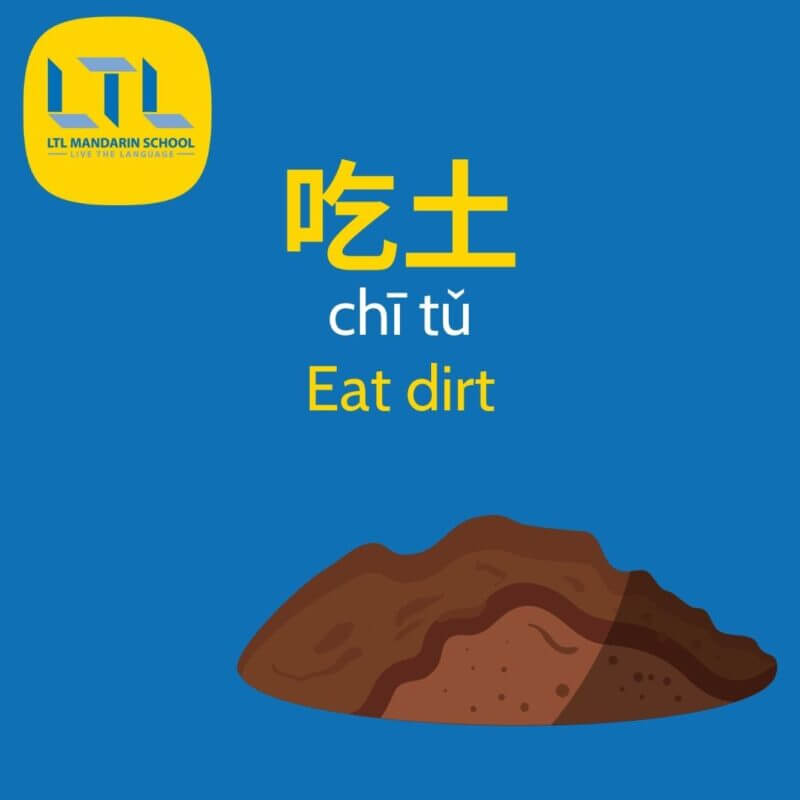
Characters:
吃 (chī): to eat
土 (tǔ): dirt/soil
This final offering comes directly from Singles Day and mainly at Chinese who spent their whole months/years wages on 11/11.
After the biggest shopping day in the world is complete many Chiense are left with empty pockets and bank accounts.
So what are they left to eat?
Nothing, they can’t afford it after all!
This is where the phrase to 吃土 了 comes from.
It’s to make light of those who spent all their money, and is all they can afford until the next payday, is to eat dirt!
BONUS | Want to learn a couple of Chinese idioms whilst you’re here? Check this quick-fire lesson with Anastaciia if so.
Chinese Slang || Conclusion
We could keep going on and on with these slang words and hot topics in contemporary Chinese society but for now, we’ll let you take in all those examples!
Check them out and you’ll learn so much more about what is going on in China at the moment!
Feel free to post your favourite Chinese slang words in the comments below.
WANT MORE – How about checking out Japans top slang words used today, the best slang in Vietnamese, Italian and Russian, plus also the most used slang in Korean.
See how it differs from slang in Chinese and your native language.
Chinese Slang || FAQs
Is 250 an insult in Chinese?
Yes it is. If you say the number 250 to someone you are inadvertently calling them an idiot. You will notice the number 250 is avoided in supermarkets and shops as a price for this very reason.
What is the meaning of YYDS?
YYDS is a new acronym in Chinese and is essentially the same as GOAT.
GOAT stands for Great Of All Time in English and YYDS stands for 永远的神 (yǒnɡyuǎn de shén) which literally means “forever the God”.
It originated when famous eSports player Shiny Ruo shouted Uzi 永远的神 (Uzi yǒnɡyuǎn de shén) to his idol Uzi, a retired Legend of League player.
What is a “leftover woman”?
This word relates to the issue that Chinese girls don’t get married as young as they did in the previous generations.
The preconceptions still hold and there is immense pressure to marry early in China. If you remain unmarried and single as young as 30, you are referred to as a leftover woman, or 剩女 (shèngnǚ) .
What is a 宅男/宅女?
This is a male or female who is addicted to being online and will never leave technology alone.
It is pronounced Zháinán/ Zháinǚ (male / female)
What is 11/11?
A huge day of discounted goods for Chinese to buy online know as Singles day.
It is on the 11th of November every year because the date looks like four single people standing beside each other (11.11).
Is 666 a good number in China?
Is it indeed a positive number used widely on social media in China. 666 (pinyin: liu liu liu) comes from 牛牛牛 (pinyin: niu niu niu) meaning awesome, excellent, great etc.
Is 250 an insult in Chinese?
Yes it is. If you say the number 250 to someone you are inadvertently calling them an idiot. You will notice the number 250 is avoided in supermarkets and shops as a price for this very reason.
What is LOL in Chinese?
Chinese use the number 233 or three letters HHH as LOL.
233 represents the sound of laughter in Chinese slang.
HHH simply represents ha ha ha (哈哈哈 hāhāhā).
How do you say “I Love You” in Chinese using numbers?
Chinese use 520 to say I Love You in Chinese due to the fact the numbers 520 sounding similar to the words for I Love You in Chinese 我爱你 – Wǒ ài nǐ.


 Hi, my name is Mojca! I am from Slovenia and I work as a student advisor at our Shanghai school.
Hi, my name is Mojca! I am from Slovenia and I work as a student advisor at our Shanghai school.
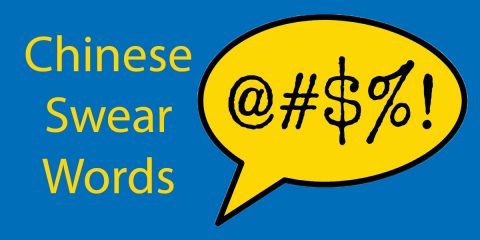

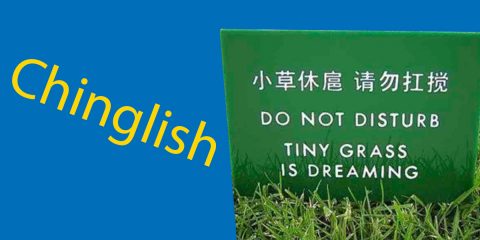
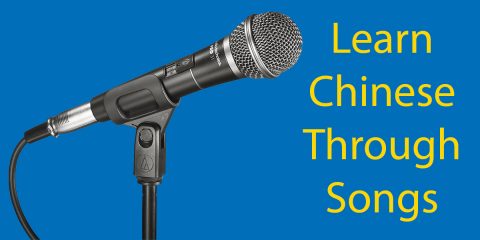

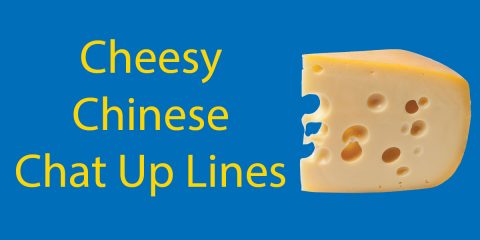
21 comments
Great article. 三Q!
555 I am finding it so hard... feel like a 250
Haha (233), very good use of the slang there Catronus.
Keep up the studying, 666!
LTL Team
So funny! Definitely use some of these
Great isn't it, lots to remember and learn!
LTL
Some really funny ones I never saw before
Thanks for the kind words Ivan
Thanks again for the article. Really great content LTL
Thanks Giulia!
MAFAN is my fave Chinese word, not slang but so useful
👏
Lol. Thanks for the laugh!
Glad you liked it JK!
[…] The meaning of 996 […]
Cool new knowledge that helps when reading chinese articles! (≧▽≦)/ By the way you wouldn't know what the chinese slang FW stands for would you?
New one for us, we'll have an ask around the office but in "English" it means "f*** with" so it could well be that!
Excellent!
But we Chinese people use number 233 is not because its sound. 233 was an emoji code on an early (about 2000-2005) Chinese well-known social media mop.com, which means 'punching the ground and laughing out loud', quite similar to LMAO in English. 233 spread from mop.com to all over the internet. Some times we append 3s to express that we are laughing wildly, e.g. 23333333333333.
Thanks for the comment Ray, interesting to hear!
Very interesting
[…] 41 Crazy Chinese Slang (for 2021) // Speak Like a (Real … […]
[…] online posts will expose you to lots of internet slang and colloquial usage of modern […]